A good number of cats never get fleas – if your cat lives indoors or has limited outdoor exposure, chances are they will never get fleas. But for those at risk of getting fleas, an infestation can make life uncomfortable for your cat and even result in you getting bitten. Luckily, they won’t make you sick or transfer to you as cat fleas are only interested in cats!
Some parasites that affect cats can be transferred through fleas so having fleas can be actually hazardous to your cat’s health as well as being a source of discomfort.
- Home Remedies For Fleas On Cats
- 1. Use A Flea Comb Regularly
- 2. Bathe Your Cat Regularly
- 3. Bathe Your Cat With Dish Soap
- 4. Use A Pet Shampoo With Natural Flea Repellents
- 5. Make/Buy An Essential Oil Flea Collar
- 6. Lemon Spray
- 7. Use A Cedar Oil Spray For Fleas On Your Cat
- 8. Lavender Spray
- 9. Chamomile Spray
- 10. Oregano Oil For Fleas On Cats
- 11. Geranium Oil
- 12. Rosemary
- 13. Aloe Vera Juice
- 14. Catnip
- 15. Neem Oil For Fleas On Cats
- 16. White Or Apple Cider Vinegar
- 17. Coconut Oil
- 18. Olive Oil
Your cat is at a higher risk if you let your cat out for any period of time in a neighborhood with a high density of other cats or if your cat lives in a rural setting with long grasses and hedgerows.
You can identify cat fleas and cats with fleas relatively easily. A cat with fleas will scratch excessively, particularly around areas fleas like to congregate – the ears, tail, and groin areas. A telltale sign is if when you part the cat’s fur you are able to spot the feces of the flea. Parting the fur, you may also see movement – a telltale sign of flea infestation. Some cats are allergic to flea bites and will lose fur in bite areas. Check for bald patches – these often indicate a problem with fleas!
If your cat is at risk you need to consider effective treatment and precautions. In this day and age, there are loads of successful chemical treatments for fleas that can snuff out an infestation fast. The problem is that some of these chemicals are non to wholesome – some even come with warnings like “keep away from children” “wash hands after use”. Clearly, this is powerful stuff, but if it is that strong can it really be that good for kitty?
It is this question that leads us owners to check out other avenues. Surely there must be natural flea treatments that maybe even the chemical options are based on, that are better for our cats and the world at large? Well, there is, and on the whole none of them require you to keep them away from children! If you want to know how to get rid of fleas on cats naturally we have compiled a rundown of 18 natural home remedies for fleas on cats here that you can treat kitty with to repel or kill fleas.
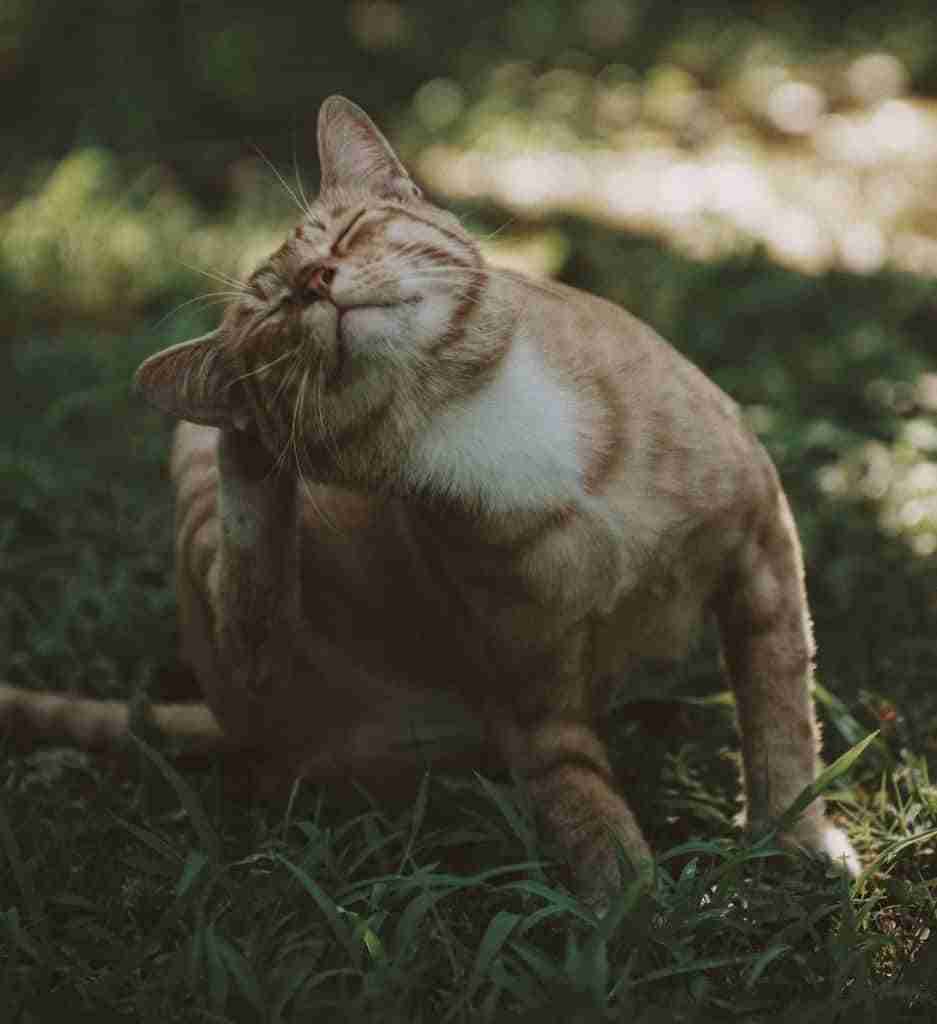
Home Remedies For Fleas On Cats
Here are some easy home remedies for fleas on cats :
1. Use A Flea Comb Regularly
This is your number one tactic in the fight against fleas. To be successful you have to comb kitty regularly even if they do not exhibit signs of fleas.
The flea comb is essentially a mechanical method of stripping fleas and their eggs off the cat’s fur so the more regular you comb the better the result – plus your cat will probably appreciate the attention once they are used to the flea comb.
Many people advise that you keep a dish of soapy water nearby to drop the fleas/eggs in so they drown. Water alone is not enough. The soap reduces surface tension so the flea sinks. Check this out.
Additionally, once you have brushed your cat’s fur use a vacuum on the surrounding area to pick up and fleas or eggs you might not have spotted. Empty the vacuum regularly or see more tactics below to maximise your efforts in the war on fleas!
This combing tactic can be supercharged with additional tactics and add-ons in your battle for flea control so carry on reading below.
2. Bathe Your Cat Regularly
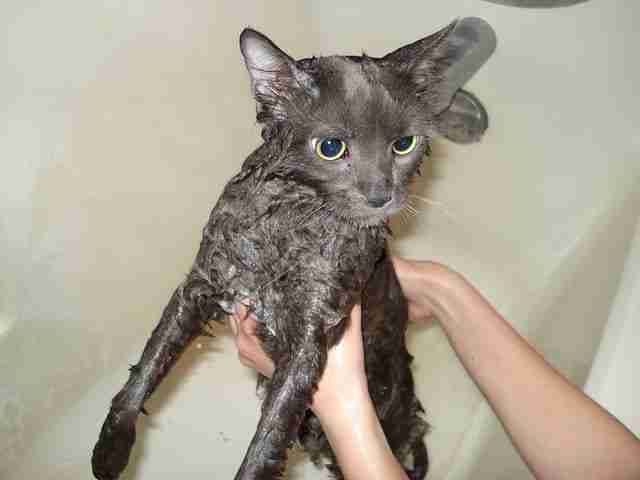
Seriously, has this dude never owned a cat? Bathe a cat – utter foolish madness unless you want your face clawed off! Granted not all cats will endure a bath but for those that will the promised land of flea free freedom lies this way…
You will delight at the sight of fleas rushing to higher ground as you bathe your cat. Seriously wash them off and drown the sons of ****. Bathing the cat with fleas makes you feel like you are taking back control and winning the war when them suckers run. If your cat just won’t cooperate by taking a bath, read on for plenty of home remedies for fleas on cats without bathing…
3. Bathe Your Cat With Dish Soap
Hell, if you’re going to get your face bitten off you may as well go the whole mile and supercharge that flea killing experience.
Get you some ordinary dish soap in the tub and explode them flea exoskeleton as they struggle in the waves of doom. Ok, I got carried away. They don’t explode..but the addition of dish soap to the water seems to drastically subdue the fleas long enough that you can safely ditch them down the drain in the knowledge that by the time they come round from the experience they are rehomed in the sewer.
If you wash your cat outdoors in a tub then don’t just tip the wastewater on the garden when finished – the fleas are not drowned they are in stasis and will come round again. Next time your pet is in the yard the suitably washed and clean fleas are likely to hop right back on again!
4. Use A Pet Shampoo With Natural Flea Repellents
You can get shampoos that contain natural flea repellents for cats online from quite a number of suppliers. Used in conjunction with the combing and bathing outlined above the shampoo will leave your pet smelling good to you but appallingly repellent to fleas!
The shampoos to look out for are those with low concentrations of cedar, lavender, eucalyptus or citrus oils included. These are natural flea repellents that can help keep you cat invisible to fleas. Now the more proactive of you should not just go buy some essential oils and started banging out mixtures of your own.
Many of these natural insecticides are pretty dangerous to cats unless concentrations are really low. This is because a cat’s liver can’t cope with some of these toxins like a human or dog might be able to as they are missing some critical enzymes. You can read more here. Stick with using store formulated shampoos that have been tested for safety.
5. Make/Buy An Essential Oil Flea Collar

You could make a natural flea collar from a cotton bandana or collar dosed up with essential oils that are known to have a repelling effect on fleas. A word of warning though, essential oils for fleas on cats have to be handled correctly.
The main essential oils for cats fleas are cedar, lavender, geranium, eucalyptus and citrus based oils. Of course, as we highlighted, some of these oils are dangerous to cats if ingested in sufficient doses – but we are not recommending you douse your cat in these essential oils.
Ideally, you want to use a low concentration oil dropped onto a cotton collar – avoid contact on the skin or putting the oil anywhere near kitty’s mouth.
If you want to be properly safe about this and love the idea of a natural flea collar then don’t mess with oils – simply buy one from a reputable brand. There are plenty online. They all tend to use the same natural oils but are able to boast of 6-8 month protection.
Beware though, these ingredients might be natural but they can be harmful – often cats can have an allergic reaction if the ingredients are in the wrong doses for them. The reaction usually takes the form of skin irritation around the collar area that clears after stopping use.
Still, a collar in conjunction with bathing, shampooing and combing should have them fleas on the run!
6. Lemon Spray

Citric acid is a natural flea killer. It will repel and kill off fleas on contact. The safest way to make a homemade flea spray with lemons is to take a few cut-up lemons, boil them in water, then steep them for a few hours. Drain off the resulting liquid into a sprayer or dish and apply it to the fur.
You can either spray the resulting lemon juice flea spray directly on – being careful to avoid eyes or as part of your combing ritual you can dip the comb in the liquid and brush through the fur.
You can use this solution as often as you need but keep a sharp eye out for any signs of irritation or skin reaction from your cat. If you see anything untoward stop treatment.
You can also use the same lemon liquid added to a wash to clear pet bedding of fleas, larvae, and eggs.
The only problem with using lemon is that cats often dislike citrus aromas. Such is their aversion to the smell that you can use a lemon or citrus spray to keep a cat out of a room without doors or stop stray cats spraying on your porch.
7. Use A Cedar Oil Spray For Fleas On Your Cat
Cedar oil is one of the essential oils that are actually non-toxic to cats but despised by fleas. Fleas don’t like the smell – trouble is kitty might be none too fond of the aroma either. However, if your cat doesn’t seem put out by the odor then there are a number of cedar options available.
You could spray the cedar oil directly on your cat’s fur. It should act as a repellent to fleas. Alternatively, you could comb the oil into the fur when you are generally flea combing. A third method of utilizing cedar oil which we have touched on would be to put the cedar oil on a cotton collar as a homemade natural flea collar.
If your cat just can’t abide the stuff your last option using cedar might be to use cedar chips sprinkled in the garden and around cat bedding as a deterrent to the little blighters.
Many owners report cedar oil for fleas and cedar shampoos to be highly effective flea remedies and actually quite pleasant smelling……if you can get kitty to go along with your plan!
8. Lavender Spray

Do fleas hate lavender? You bet! Lavender and fleas don’t get on! Lavender is almost as effective at killing off fleas as the commercial chemical flea killers. The active ingredient is linalool and it is found to be highly toxic to the cat flea at all stages in its life cycle – good news! The bad news is that high concentrations of lavender oil can poison your cat – boo.
To put all that into context: Linalool generally makes up 50% of lavender oil and said lavender oil will poison your cat. But, linalool in a 1% concentration in a dip will strip a cat of fleas! Additionally treating the carpet with a 1-5% spray will prevent the emergence of fleas by killing them off in all life stages.
So how to harness this power without poisoning the cat? What you do is get some real lavender, avoid essential oil, and steep the real lavender overnight in water. The next day you remove the lavender plant and use the water as a dip, spray or to comb into your cat’s fur. This way you keep concentrations minimal whilst getting the benefits of the linalool. You could use this lavender spray for fleas daily if necessary.
By all means water down lavender oil and spray on furniture and fabrics to remove/kill fleas in the home but make sure your cat doesn’t ingest the high concentration gear.
9. Chamomile Spray

Chamomile is a natural flea repellent. This means you can use some standard, widely available chamomile tea bags to help sort out a potential flea problem!
The first thing to do is to leave some chamomile tea bags around your cat’s bedding. This will deter fleas.
The second thing to do is boil up a cup of tea! Leave the tea to go cold and then spray or apply with a brush to your cat’s coat and any areas where your cat may be itching and scratching.
The effect is two-fold. Firstly the chamomile will repel the fleas and secondly, the tea will help soothe itching bites and skin.
You can also use chamomile in its natural state. Like lavender, take a few dried flowers and steep them in a cup of water for a few hours. Remove the flowers and use the water in a flea spray or on a brush to comb into the fur.
You can apply camomile tea on a daily basis as a homemade flea spray without harming your cat and the fleas will just hate it!
10. Oregano Oil For Fleas On Cats
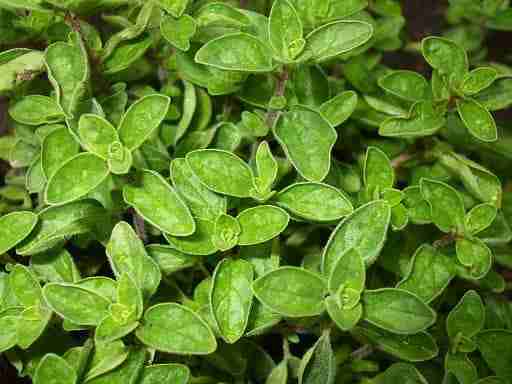
Is oregano oil safe for cats? Oregano has a natural ingredient called carvacrol that makes a very effective natural flea repellant. The problem is that oregano contains phenols that are also very bad for your cat. As a result, you can’t use concentrated oregano oil liberally on your cat – you need to seriously reduce concentration.
A favored method of using oregano oil is to mix the oil with olive oil on a basis of three drops of olive oil to one of oregano. The resulting mixture can then be applied with a cotton ball to areas of the cat that fleas like to congregate on but that is also out of reach of the cat. The usual areas are on the backs of the ears, base of the tail, neck and stomach.
A secondary method of using oregano oil might be to use the oil on a homemade flea collar. Adding a low concentration dose of oregano to a cotton collar along with other low concentration oils can make a collar that will keep fleas at bay!
If you do use oregano to treat fleas keep a sharp lookout for any negative effects and stop treatment immediately if your cat shows signs of irritation, fur loss or change in demeanor.
11. Geranium Oil
As with oregano oil, too much geranium oil can be highly toxic to your cat. However, geranium oil is a natural flea killer and soon gets them on the run. Some people recommend adding four drops of geranium oil to a cup of water to make a spray that can effectively repel fleas.
As with oregano, diluting and adding to a homemade flea collar is an option with the added benefit that geranium oil makes a great tick repellant. Alternatively, if you are able to get your cat bathed you can add a couple of drops of the oil to the water as you go for a final rinse. This is often enough to act as a repellent for a few days.
12. Rosemary
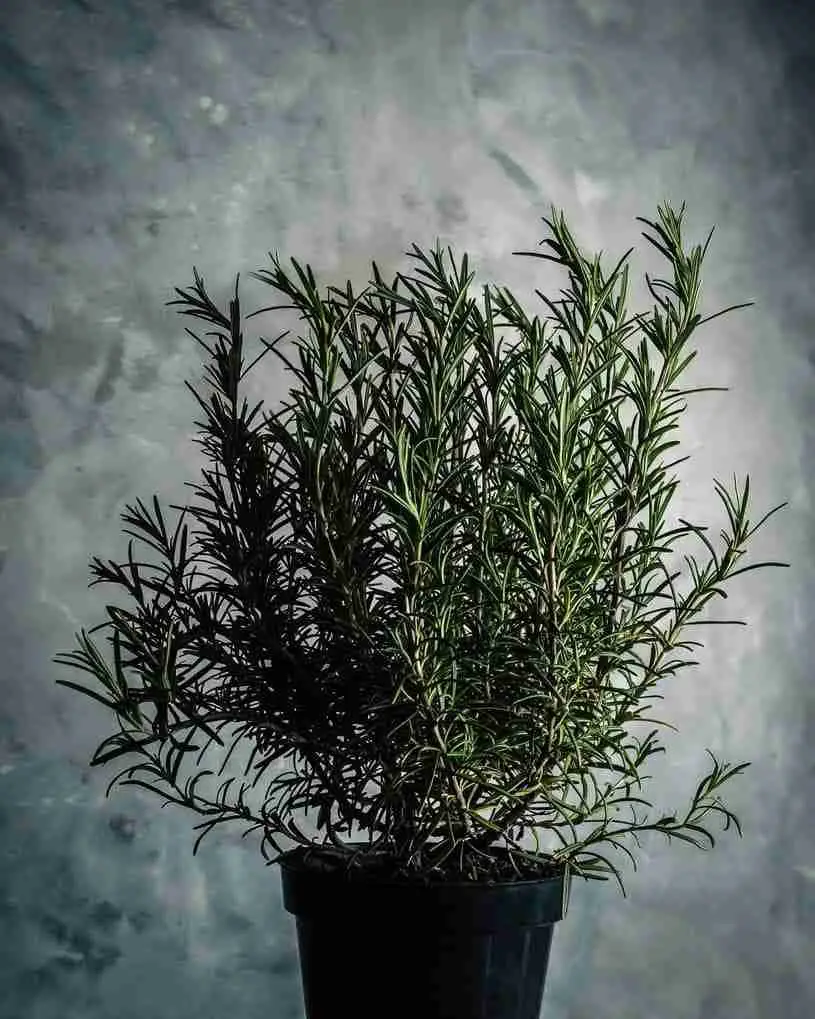
Rosemary is another herb that is fundamentally a great natural flea killer.
Rosemary is somewhat safer for cats than some of the other essential oils – particularly as you get the dried herb and steep it like with lemon, lavender or chamomile or get fresh and boil it up in the water for 30 minutes to make a great homemade flea spray.
The resulting rosemary water can be used as a homemade spray for bedding and furniture or be applied directly to the cat’s coat.
If all that sounds like too much work you can just buy rosemary flea spray online…….Acts as a great natural flea repellant and will kill eggs, larvae, and adult fleas as well as kill ticks and mosquitos.
Some users report that rosemary water has a very fast effect soon bringing scratching cats to comfort as flea activity drops off.
13. Aloe Vera Juice

Aloe vera juice is well known to be a natural anti astringent and antiseptic for humans but it is also a great natural flea repellent for cats. Mixing the juice with some cayenne pepper makes a fantastic all natural flea repellent that is non-toxic to cats.
The juice by itself or with the pepper can be spritzed or combed onto the fur to act as a repellent. You can add the juice to a bath to rinse your cat in providing a nourishing balm with repellent qualities to the cat’s coat. If your cat already has bites the aloe vera juice will calm itching and defend open skin wounds from infection.
However, just because the juice is non-toxic doesn’t mean the whole plant is safe. The “milk” that is released when the plant is broken is highly toxic so be sure to only use the clear juice.
14. Catnip
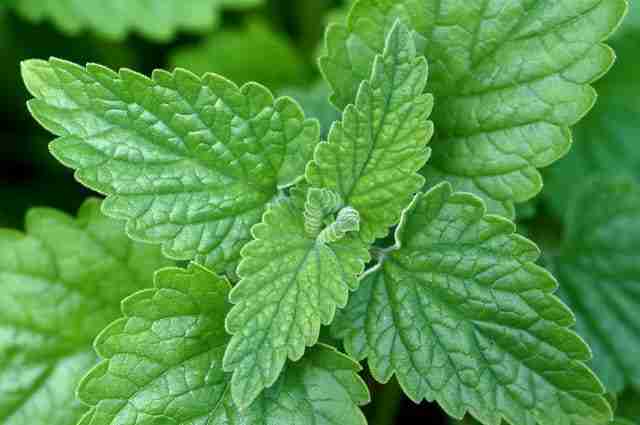
Along with rosemary and cedarwood, catnip is harmless to cats but actually a very good flea repellent! What makes this particularly pleasing is unlike many items on the list a high proportion of cats actually love this stuff.
If your cat loves this stuff you will probably have noticed the euphoria the catnip brings out in your kitty. If your cat is in unaffected it just doesn’t notice anything.
You can use catnip in a number of ways with regards to repelling fleas :
You can grow catnip in your yard where it will repel fleas from your yard as they just hate the smell of the stuff (the odor is just a nice minty aroma).
Secondly, you can grab and cut up catnip leaves and rub them/deposit them over your cat’s bedding to repel fleas and get them to move on.
Thirdly you can brush your cat down with the stuff and this will act as a repellent to the fleas.
The fourth option is to get some catnip oil and add it to a homemade flea collar as a deterrent. You can also put some oil on scratch posts to deter fleas and get some oil on your cat in an unobtrusive manner.
If you decide to grow catnip in your yard so you have a handy supply, just remember you might end up attracting local cats into your yard and kicking off a turf war…
15. Neem Oil For Fleas On Cats

Out of everything on this list, neem oil is probably the standout just because you might never have heard of it! All the others and ones to follow are generally household or readily available items. Neem oil ain’t. That is because this stuff comes from trees only found in places in south-east Asia like India, Burma and Sri Lanka.
Neem oil comes from the neem tree. You can read a load about it here. To paraphrase and quickly get to the point neem oil is safe for cats, should be used in a low concentration (about 1% for shampoos and sprays) and works because it contains a powerful natural insecticide called azadirachtin.
Azadirachtin works to repel and kill mosquitoes, fleas and biting midges. Some of the other active ingredients in neem oil work to reduce itching and soothe inflamed skin. Neem oil can be bought online and you can use it in a spray, shampoo, applied to bedding or combed into cat fur or on a homemade natural flea collar. There is one drawback – this stuff stinks. Bad. But if you can live with it it is touted to be a miracle cure.
Always dilute, concentrated neem oil can cause irritation. If you put too much on your cat you might expect to see your pet vomit, convulse, become lethargic or suffer respiratory distress – you have been warned, safe until you get silly with it!
16. White Or Apple Cider Vinegar
Vinegar has a huge range of uses around the house from cleaning, cooking and health standpoints but did you know that a good old dose of vinegar can also be effective against cat fleas?
Both white vinegar and the more fashionable apple cider vinegar can be used against fleas due to the acidity of the acetic acid found in the vinegar.
Does vinegar kill fleas? These kinds of vinegar destroy flea eggs and the aroma and taste repel adult fleas.
When applied topically the fleas will literally jump off your cat and if you follow up with a flea comb you will find you kill off loads of fleas – with these fleas you should dispose down the sink so that if they revive they are rehomed away from your pet, house or yard.
You can use either type of vinegar but cats may prefer apple cider vinegar due to the taste and aroma.
The best way to use the vinegar is to apply neat to your cat’s coat – problem is that most cats won’t allow this. If your cat just won’t go there then water down the vinegar so you have a 50:50 solution with water or even lemon juice. Even at this concentration, the vinegar will effectively repel and knockout the fleas.
You should ideally spray your cat and let the solution dry naturally. You should also treat your house with the same spray. Your cat and house will smell of vinegar initially but this will dissipate as the solution evaporates.
If you can bathe your cat then you can also use the vinegar in the bath water. This will work as a repellent for a few days – but have plan b lined up ready to swing into action.
Additionally, if you want to go the full mile you can wash/soak clothing and bedding in a vinegar solution to effectively kill flea eggs and repel fleas.
17. Coconut Oil

These days coconut oil is widely available in most markets. If you struggle to find it locally you can pick up coconut oil very cheaply online. It is lauded for its health benefits in humans but did you know it is also a great cat flea killer?
So how does coconut oil kill fleas? Coconut oil has powerful antiparasitic, antimicrobial, and anti-inflammatory abilities due to the lauric acid found in the oil and the high-fat content of the oil that suffocates fleas. Using coconut oil on your cat will soothe irritated skin, kill off fleas, and is safe for cats – indeed by grooming after the oil has been topically applied to their coats they may get some of the other benefits of coconut oil for cats. It can really useful for reducing hairballs.
To treat a cat with fleas bath the cat and then apply coconut oil to the skin and fur. Leave in place for a few hours and then rinse away watching the dead fleas wash out – in fact, the cat will most likely remove the oil after a few hours by licking but the oil will still do the job.
18. Olive Oil

Olive oil can, surprisingly, be a very effective flea killer. As with coconut oil, you simply rub the olive oil into the fur and skin of your infested cat and let the oil get to work.
Olive oil does not contain lauric acid, but it is thought that the high-fat content suffocates fleas and there may be other natural insecticides within the olive oil that naturally deal with the fleas.
Leave the oil for a few hours and then rinse it off or comb it out if your cat if it hasn’t groomed the oil off already!
Olive oil is often used to reduce the concentration of essential oils such as lavender, oregano, or geranium but can work very effectively on its own. The oil is non-toxic to cats so you can use it without fear. This is particularly useful if you want to treat a kitten or don’t want to chance essential oils.
